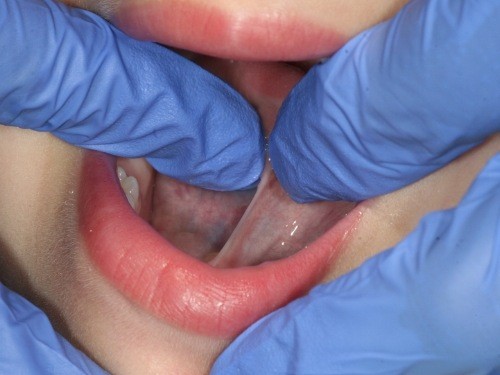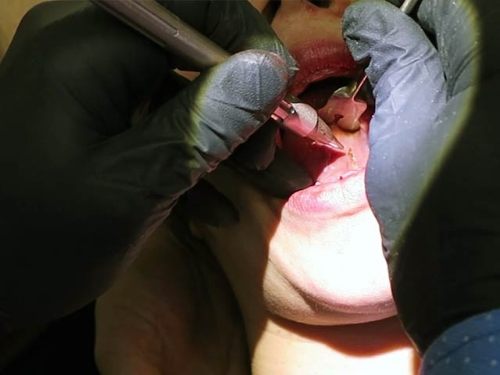Tongue-Tie Treatment - Cleveland, OH
Greater Oral Function for Cleveland Patients

Many terms are used to describe tongue-tie treatment, but the most common is “frenectomy.” For centuries, this process has helped children and adults achieve greater oral function. But fortunately, advancements in dentistry have made it possible for this procedure to be more accurate, precise, and most importantly, comfortable. Using the LightScalpel laser, Dr. Csok can ensure greater success in treating tongue-ties. Call us today to schedule a consultation to discuss your options for tongue-tie treatment in Cleveland, OH.
The Frenectomy Process

When choosing to undergo a frenectomy, you will find that the main goal is to simply loosen the tissue and create greater oral function. By releasing the connective frenulum, you or your child can perform day-to-day tasks that were once difficult and/or impossible.
But to achieve this, Dr. Csok must remove excess tissue with the help of a dental laser.
Laser Frenectomy

Unlike a traditional frenectomy that relies on scalpels and sutures to complete the process, a laser frenectomy is more accurate, precise, safe, and comfortable to use. Equipped with a concentrated beam of light, it targets the excess tissue, removing it and creating a greater range of motion for the lip or tongue. Patients undergoing this process often need no sedation, as the procedure is quick and minimally invasive. Also, by using a dental laser, there is less bleeding and swelling, and the recovery phase is significantly reduced.
What Happens During a Laser Frenectomy?

A soft tissue laser operates differently from traditional cutting methods. It uses light energy to vaporize the tissue, resulting in a gentle procedure. The use of a soft tissue laser ensures minimal discomfort for patients, with some babies and children even sleeping through the process. Additionally, the laser's precision causes almost no bleeding, and its sterilizing effect reduces the risk of infection significantly.
Who’s a Good Candidate for Laser Frenectomy?

The ideal candidate for a laser frenectomy procedure is a child with a tight frenum. If this condition is left untreated, it can hinder proper latching during breastfeeding and result in speech difficulties as the child grows. Mothers may also experience sore and painful nipples during breastfeeding. Our pediatric dentist strongly recommends consulting your child's pediatrician to determine the most suitable procedure for your child's condition.
Benefits of Laser Frenectomy

Laser frenectomy offers several incredible benefits! By using light energy to precisely vaporize tissue, it provides a gentle and virtually painless experience for patients, including babies and children. This quick and efficient treatment minimizes bleeding, reduces the risk of infection, and accelerates the healing process. Whether it's addressing speech difficulties, improving breastfeeding latch, or enhancing overall oral health, laser frenectomy delivers remarkable results with beautiful tissue restoration and a lower chance of relapse.
Advanced Technology for Precision Care

Using the state-of-the-art LightScalpel laser, Dr. Csok can generate more accurate results using optimal precision. This CO2 laser cauterizes the tissue so that there is little to no bleeding, and it sterilizes the area to reduce the chances of infection.
By using this type of laser technology, our patients can spend less time in our specialty dental office undergoing treatment and instead, spend more time enjoying the benefits of living with an untethered lip or tongue.
Recovering From a Frenectomy

A frenectomy is a relatively straightforward surgical procedure performed to address issues related to the lingual or labial frenulum, the thin tissues connecting the tongue or lips to the floor of the mouth. While it's a routine procedure, proper recovery is crucial for optimal healing and reduced discomfort. Here's what you can expect during the recovery process and some helpful tips to consider.
What Should You Expect?

After a frenectomy, the healing process involves several stages.
In the initial 0-48 hours, one can expect slight discomfort, manageable with pain relievers. Minimal bleeding may occur, but it typically subsides swiftly. Some mild swelling, especially for lingual frenectomies, can be eased with a cold compress.
Days 2-7 require diligent oral hygiene, including rinsing with warm salt water to prevent infection. A soft diet comprising gentle foods like yogurt and mashed potatoes is advised to avoid irritation. It's important to refrain from habits like straw-sucking or pacifier use.
Days 7-14 may involve a follow-up appointment with your dentist, and a gradual return to a regular diet is permissible if discomfort is absent.
In Weeks 2-4, most discomfort, swelling, and potential bleeding should have diminished, and dissolvable stitches will begin to dissolve, signifying complete healing.
Recovery Tips for Infants & Toddlers

For infants and toddlers undergoing a frenectomy, special care is needed to ensure their comfort and well-being:
- Feeding – For babies, breastfeeding or bottle-feeding may be slightly challenging initially. It's important to be patient and offer support during feeding sessions.
- Oral Exercises – Your pediatrician or dentist may recommend specific exercises to help promote proper tongue movement and function. Consistent practice can help in the recovery process.
- Comfort Measures – Use age-appropriate pain relief methods recommended by your healthcare provider, such as infant-safe pain relievers or soothing topical gels.
- Monitoring – Keep a close eye on the surgical site for any signs of infection, excessive bleeding, or unusual swelling. If you notice anything concerning, consult your healthcare provider promptly.
When Should You Call Your Doctor?

While the frenectomy recovery process is generally smooth, there are instances where you should contact your healthcare provider:
- Excessive Bleeding – If bleeding persists beyond the immediate post-operative period or suddenly worsens, seek immediate medical attention.
- Signs of Infection – Watch for symptoms like fever, increasing pain, or pus around the surgical site. These can be indicative of an infection that requires prompt treatment.
- Severe Discomfort – If your pain becomes severe and is not alleviated by prescribed or over-the-counter pain medication, consult your healthcare provider.
- Unusual Swelling or Bruising – While some swelling is normal, excessive or unexpected swelling, along with significant bruising, should be reported to your doctor.
It’s important to remember that every individual's healing process may vary slightly, so it's crucial to follow your healthcare provider's post-op instructions and attend any scheduled follow-up appointments for the best outcome.

